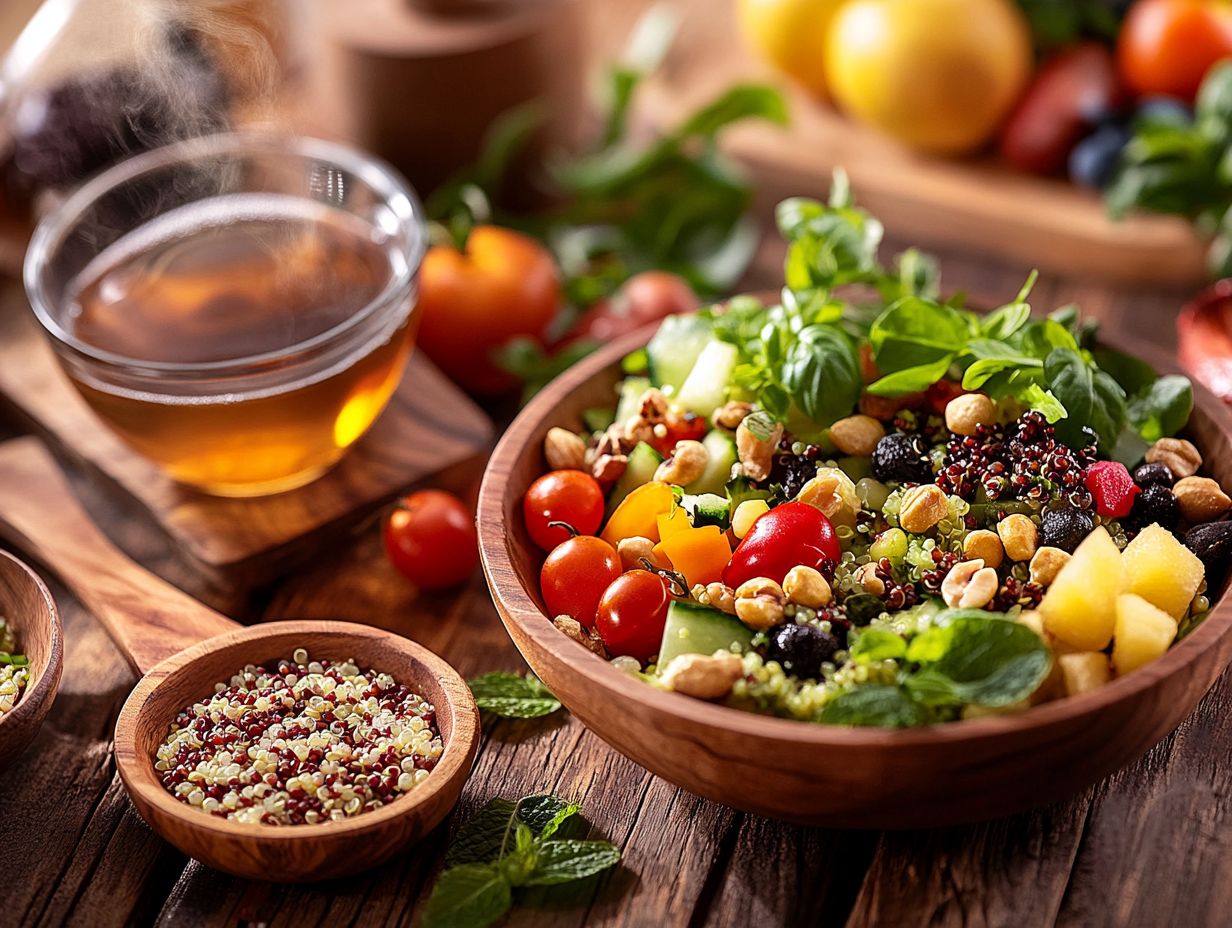10 Foods to Enjoy Mindfully Today
Eating transcends mere routine; it s a chance for you to nourish your body and truly savor each moment.
This article delves into ten delectable foods that not only enhance your health but also promote a mindful eating practice. From the luxurious taste of dark chocolate to the vibrant crunch of leafy greens, each selection boasts its unique benefits.
You ll also discover what mindful eating entails, why it matters, and how you can seamlessly weave it into your daily life. Ready to transform your relationship with food? Let s dive in!
Contents
- Key Takeaways:
- 1. Dark Chocolate
- 2. Avocado
- 3. Berries
- 4. Nuts and Seeds
- 5. Leafy Greens
- 6. Whole Grains
- 7. Fermented Foods
- 8. Fatty Fish
- 9. Herbal Teas
- 10. Colorful Vegetables
- What Is Mindful Eating and Why Is It Important?
- Frequently Asked Questions
- What are 10 Foods to Enjoy Mindfully Today?
- Why is it important to enjoy these foods mindfully?
- How can I incorporate dark chocolate into my mindful eating practice?
- What are some ways to enjoy avocado mindfully?
- How can I incorporate herbal teas into my mindful eating routine?
- Are there any specific ways to enjoy water mindfully?
- What are some tips for incorporating these foods into my daily diet?
Key Takeaways:

- Indulge in dark chocolate mindfully to satisfy your sweet cravings and boost your mood.
- Enjoy avocado on whole-grain toast with a perfectly poached egg delicious!
- Incorporate a variety of colorful berries in your diet for a mindful and tasty source of antioxidants.
1. Dark Chocolate
Dark chocolate isn t just a delightful indulgence; it s a heart-healthy option that satisfies your cravings while delivering a wealth of nutrient benefits. It s the ideal choice for anyone who is mindful of their food selections and eating habits.
Loaded with antioxidants, dark chocolate plays a vital role in promoting overall health by fighting damage caused by free radicals and enhancing blood circulation. Integrating it into your mindful eating practices and savoring a small piece can elevate your enjoyment and help curb excessive snacking especially during the festive season.
Its rich, luscious flavor serves as a satisfying alternative when holiday indulgences tempt you, striking a perfect balance between pleasure and nutrition. To ensure you re selecting a top-notch product, pay close attention to the cocoa content aim for 70% or higher and seek out brands committed to ethically sourced ingredients.
2. Avocado
Avocado is a remarkable fruit celebrated for its heart-healthy fats and ability to enhance nutrient absorption. It s an essential component of mindful eating and nutritious recipes that support digestive health and create balanced meals.
Filled with vitamins E, K, and B6, this creamy delight elevates the nutritional profile of your dishes while enriching their flavors and textures. By adding it to your meals like in salads or smoothies you enhance both taste and satisfaction, contributing to a more mindful approach to managing emotional eating.
The velvety texture and rich, buttery flavor offer a sensory experience that fosters feelings of comfort and fullness, making it easier to adopt healthier eating habits. Here are some tasty options for your meals:
- Enjoy avocado on whole-grain toast with a perfectly poached egg delicious!
- Adding it to a vibrant salad.
Such combinations increase your nutrient intake and celebrate the joy of intentional eating.
3. Berries
Berries, like blueberries and strawberries, deliver a delightful burst of flavor and nutrients that elevate any meal, enriching your dining experience and emotional well-being through the art of mindful eating.
These small yet mighty fruits are celebrated for their impressive antioxidant content, which helps combat oxidative stress and inflammation in your body. Incorporating berries into your meals allows you to indulge your taste buds and satisfy cravings in a healthier way; their natural sweetness diminishes the urge for less nutritious snacks.
Savoring each bite helps you genuinely appreciate the health rewards they provide. In terms of selecting fresh berries, mindful shopping is crucial. Look for vibrant colors and firm textures. Consider visiting local farmers’ markets to ensure you re choosing the finest quality produce available.
Start your mindful eating journey today!
4. Nuts and Seeds
Nuts and seeds are packed with healthy fats and protein. They are fantastic choices for portion sizes in balanced meals and promote mindful eating while enhancing food satisfaction.
Their diverse nutrient profiles bring additional perks, including antioxidants, fiber, and essential vitamins and minerals that support overall health. For example, walnuts are an excellent source of omega-3 fatty acids, renowned for their heart health benefits, while legumes provide a robust source of plant-based protein.
When you prepare these foods mindfully through soaking or roasting you not only elevate their flavors but also enhance nutrient absorption. Incorporating them into simple recipes like energy balls or salads can help manage stress eating. By tuning in to how these foods make you feel, you can cultivate greater self-awareness about your eating habits.
5. Leafy Greens
Leafy greens are the cornerstone of your healthy eating journey. They are brimming with essential nutrients that bolster digestive health and enhance nutrient absorption. They align seamlessly with mindful eating practices to create balanced meals.
These vibrant vegetables think kale, spinach, arugula, and Swiss chard offer a treasure trove of vitamins, minerals, and antioxidants, contributing significantly to your overall wellness. When you plan your meals, incorporating these greens elevates the nutritional value and adds a delightful burst of flavor, making every bite a pleasure.
To fully embrace the benefits of these nutrient-dense foods, consider exploring creative recipes that showcase their versatility, such as:
- Salads
- Smoothies
- Stir-fries
By thoughtfully evaluating your food combinations and opting for seasonal varieties, you enhance satisfaction at every meal while cultivating a more mindful eating experience that is health-focused.
6. Whole Grains

Whole grains are vital to achieving a balanced diet. They offer sustained energy and support healthy eating habits that foster mindful food choices and contribute to your overall wellness.
Incorporating a variety of whole grains into your daily meals is particularly crucial if you’re aiming to enhance your heart health. These grains are abundant in fiber, antioxidants, and essential nutrients, which work together to lower cholesterol levels and promote better digestion.
When you re out shopping for whole grains, scrutinize labels carefully. Look for products that list whole grains as the first ingredient, and steer clear of those laden with added sugars or preservatives.
Try experimenting with exciting cooking methods today, like steaming or baking, to bring out the natural flavors and textures of these grains. This way, your meals will be both delightful and nutritious.
7. Fermented Foods
Fermented foods, like yogurt and sauerkraut, are not just delightful additions to your plate; they work wonders for your digestive health and elevate the overall quality of your meals. They perfectly align with your mindful eating practices and help you manage emotional eating.
These tasty treats are loaded with probiotics, which are beneficial bacteria that promote gut health by balancing your digestive system and enhancing nutrient absorption. Incorporating these tangy staples into your daily meals is easy; consider adding a scoop of kimchi to your grain bowl or a dollop of kefir to your smoothies. If you re feeling adventurous, preparing fermented foods at home with fresh vegetables and herbs not only boosts their flavors but also offers a gratifying culinary experience.
By being mindful of how these foods integrate into your diet, you can truly savor their unique tastes while enjoying the myriad of health benefits they bring. Consider trying 5 mindful eating exercises to enhance your experience and remember to incorporate these foods into your everyday meals for optimal health and wellness.
8. Fatty Fish
Fatty fish, such as salmon, are not only a treat for your taste buds but also classified as heart-healthy foods. They can satisfy your cravings while delivering essential nutrients for your overall health and well-being.
These fish are abundant in omega-3 fatty acids, which are vital for reducing inflammation and enhancing brain health. By incorporating fatty fish into your diet, you can tackle stress eating head-on. These nutrient-dense options promote increased satiety and help curb unhealthy snack cravings.
If you re eager to reap these benefits, try delicious recipes like grilled salmon paired with quinoa and spinach. You could also enjoy a zesty mackerel salad that transforms nutritious meals into delightful experiences.
When you’re shopping for seafood, make a point to seek out sustainable options. This supports the ocean’s ecosystems and ensures you re consuming quality fish.
9. Herbal Teas
Herbal teas offer a delightful alternative to sugary beverages. They encourage mindfulness while enhancing your enjoyment of food, helping you manage cravings and curb stress eating.
These fragrant teas, crafted from a variety of herbs and botanicals, present a wealth of health benefits that nurture your emotional well-being. For example, chamomile is celebrated for its tranquil qualities, making it perfect for unwinding after a long day. In contrast, peppermint can invigorate your senses and sharpen your focus.
Incorporating a variety of herbal teas into your daily routine boosts hydration and turns tea time into a mindful moment. As you prepare these flavorful brews, savor their vibrant colors and enticing scents.
Choose teas that resonate with your personal taste preferences. This can seamlessly align with healthy eating habits, ensuring that each sip is both pleasurable and nourishing.
10. Colorful Vegetables
Colorful vegetables do more than brighten up your plate; they bring a bounty of nutrients that support research underscoring the importance of food quality the nutritional value of what you eat and mindful eating practices.
By weaving a variety of these colorful vegetables into your daily diet, you unlock a treasure trove of health benefits. Think improved digestion, a boosted immune system, and radiant skin. Embracing a spectrum of textures and hues can awaken your taste buds and transform meals into an exciting meal experience.
The art of mindful preparation whether you re roasting, saut ing, or steaming can elevate flavors and aromas, creating a truly enriching dining experience.
This intentional approach enriches your daily meals and nurtures a deeper appreciation for wholesome ingredients, fostering a healthier, more rewarding relationship with food overall.
What Is Mindful Eating and Why Is It Important?
Mindful eating invites you to become more aware of your food choices and eating behaviors, enabling you to cultivate a healthier relationship with food while enjoying notable health benefits, particularly in managing emotional eating and cravings.
By tuning into the sensory experience of eating savoring the taste, feeling the texture, and inhaling the aroma you can transform mealtimes into a more enjoyable and fulfilling ritual. This focus elevates your appreciation for food and enhances digestion. Eating slowly allows your body to process flavors and recognize signals of fullness more effectively.
Integrating mindfulness into your daily meals can aid in weight loss by curbing mindless snacking and emotional eating. This helps you identify and respond better to your hunger cues. The core principles of mindful eating foster a positive cycle of emotional well-being, guiding you toward more conscious food choices that nourish both body and mind.
How Can Mindful Eating Help with Weight Management?

Mindful eating can be a game changer for your weight management journey. It enhances your awareness of hunger cues and controls how much food you take. This practice cultivates healthier eating habits that contribute to sustainable weight loss.
By taking the time to slow down during meals, you can better recognize when you re genuinely hungry or satisfied. This recognition helps curb overeating. Integrating simple strategies like pausing to take a deep breath before you dive into your meal can center your thoughts and intentions. This reduces the chances of eating impulsively due to emotions.
Keeping a food journal can be incredibly beneficial as well. It encourages you to reflect on not just what you eat, but also when and why you eat. This reflection provides valuable insights that may lead to more balanced choices.
Evaluating your eating schedule especially by pinpointing habitual snack times or mindless munching enables you to make conscious adjustments when necessary.
What Are the Benefits of Eating Mindfully?
Eating mindfully brings a treasure trove of benefits! Enjoy heightened enjoyment of your meals, improved emotional responses, and a notable reduction in stress eating, all of which contribute to your overall well-being. For more insights, check out these 7 tips for mindful eating.
By taking the time to savor each bite, you can significantly enhance your digestion. This enables your body to process food more efficiently and aids in nutrient absorption while deepening your connection with what you re eating.
Many who embrace mindful eating find greater satisfaction in smaller portions. This makes it much easier to resist the temptation to overeat. Techniques such as breathing exercises before meals and paying attention to the vibrant colors and textures of your food can truly elevate your dining experience.
Ultimately, weaving these mindfulness practices into your routine can lead to improved emotional health. This alleviates anxiety tied to food choices and nurtures a more positive relationship with eating.
How Can One Incorporate Mindful Eating into Their Daily Routine?
Incorporating mindful eating into your daily routine is easier than it sounds! Start with simple practices like mindful meal planning and explore 10 mindful snacking ideas for healthier choices that enhance your effective food preparation techniques.
Create those precious mindful moments during meals that truly enhance your awareness and satisfaction. Establish a regular eating schedule to help your body understand when it genuinely needs food.
Minimizing distractions like turning off screens and setting aside your phone during meals can transform your dining experience into something far more engaging and meaningful. Embrace slow eating techniques; savor each bite and take moments to pause between bites.
This not only boosts your enjoyment but also leads to better digestion, cultivating a more intentional relationship with food.
What Are Some Common Mindless Eating Triggers?
Common mindless eating triggers include environmental cues, emotional responses, and food distractions. These can easily lead to overeating and a disconnect from your body s hunger signals.
These triggers often arise from a mix of societal norms and personal habits that have taken root over time. For example, when you find yourself in places where food is abundant like parties, movie theaters, or even your own pantry it s easy to snack mindlessly, even if you re not hungry. Emotional states such as stress, boredom, or sadness can drive you to eat for comfort or distraction.
To combat these tendencies, you can embrace mindful eating practices, such as:
- Eating slowly
- Paying attention to portion sizes
- Listening to your body s hunger signals
Establishing designated meal times and creating an eating space without distractions can also help you cultivate greater awareness during meals. Start recognizing your triggers today and take control of your eating habits!
Conclusion
In summary, mindful eating can lead to a transformative relationship with food. By understanding your hunger cues, enjoying your meals more, and being aware of your eating habits, you can unlock the benefits of mindful eating for a healthier lifestyle. So, why not start today?
How Can One Overcome Mindless Eating Habits?
Overcoming mindless eating habits demands your commitment to focusing on the present moment, self-awareness, and regular evaluations of your food choices and eating behaviors to cultivate healthier habits.
To effectively start this process, you can begin by journaling your food habits. This encourages you to reflect on when and why you eat, helping you uncover emotional triggers and gain insight into your personal cravings.
You can also seek support from professionals, like a dietitian in Victoria, who can provide you with tailored guidance, offering valuable insights you might overlook when going it alone.
Incorporating mindfulness techniques during meals like savoring each bite and recognizing your hunger cues deepens your connection to food. This promotes intentional eating and makes healthier choices more sustainable in the long run.
Frequently Asked Questions
What are 10 Foods to Enjoy Mindfully Today?

The 10 mindful eating habits for a healthier lifestyle include enjoying foods like dark chocolate, avocado, blueberries, leafy greens, salmon, nuts and seeds, whole grains, fermented foods like yogurt or kimchi that are good for digestion, herbal teas, and water.
Why is it important to enjoy these foods mindfully?
Mindful eating involves paying attention to the food you eat, savoring each bite, and being present in the moment. Using tools like mindful eating apps can lead to improved digestion, better food choices, and an overall healthier relationship with food.
How can I incorporate dark chocolate into my mindful eating practice?
Choose a high-quality dark chocolate with at least 70% cocoa content and slowly savor a small piece, paying attention to the flavors and textures. Savoring dark chocolate can truly satisfy your cravings and reduce the likelihood of overindulging.
What are some ways to enjoy avocado mindfully?
Avocado can be enjoyed mindfully by adding it to a salad or toast and taking the time to appreciate its creamy texture and nutty taste. You can also make homemade guacamole and enjoy it with vegetables for dipping.
How can I incorporate herbal teas into my mindful eating routine?
Brewing a cup of herbal tea and taking the time to sit and savor the warm, soothing drink can be a great way to practice mindful eating. Pick a tea you love and truly enjoy every sip while taking note of the aroma and taste as you drink it.
Are there any specific ways to enjoy water mindfully?
Drinking water mindfully involves paying attention to the sensation of thirst and fully immersing yourself in the act of drinking. Take small sips and notice how the water feels in your mouth and throat.
What are some tips for incorporating these foods into my daily diet?
Don’t wait! Choose one or two of the 10 tips to practice mindful eating daily and incorporate them into your meals or snacks. Gradually add more of these foods into your diet and be mindful as you eat them. Try to include a variety of these foods throughout the week for balanced nutrition.






